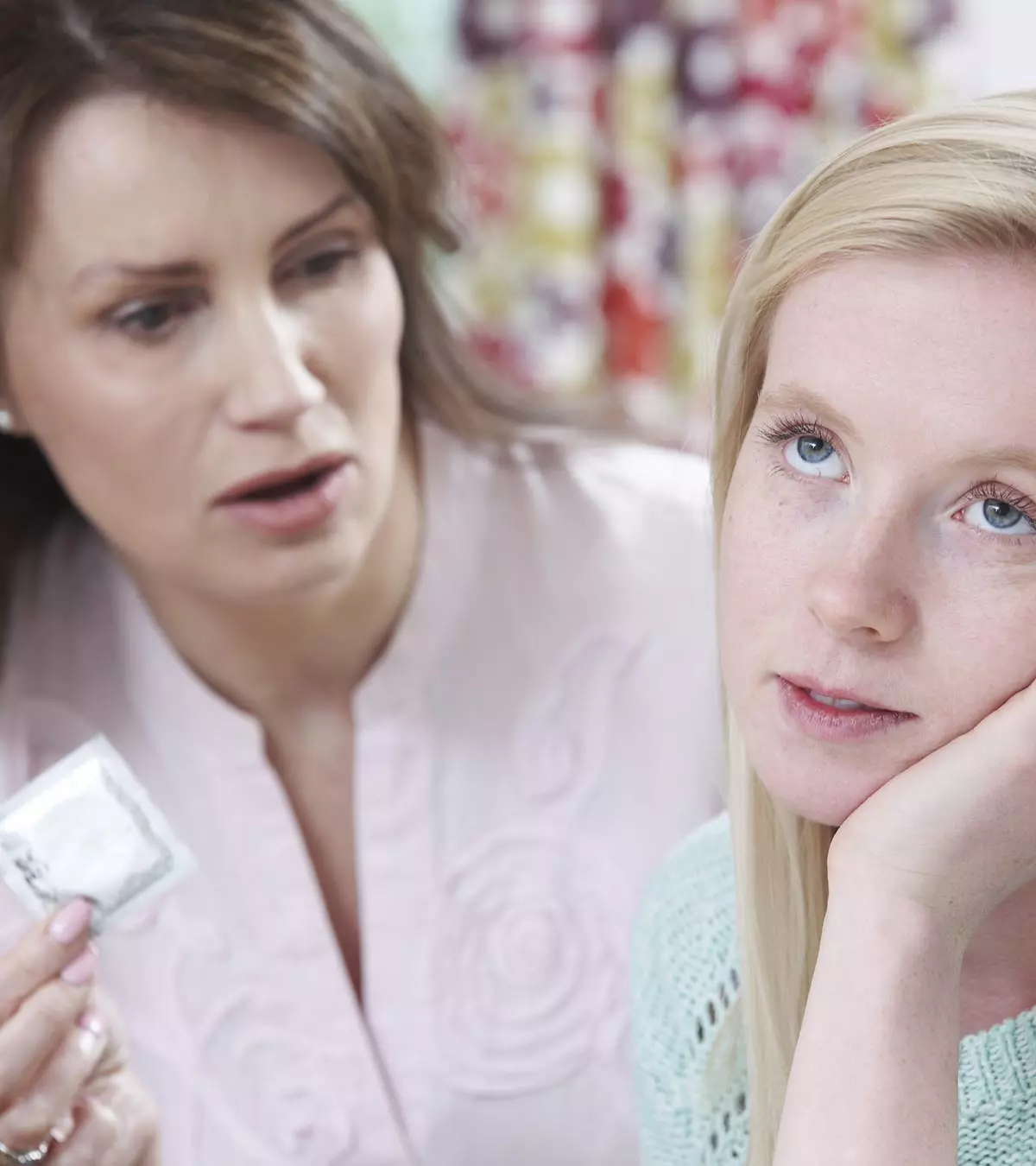
Image: ShutterStock
Sex education for teens is the responsibility of every parent and teacher. They can provide teenagers with the right information so that they are not misguided through other sources like magazines, friends, and websites. As parents, many of us find it awkward and difficult to begin with the topic, and thus, this post is helpful. When your teen hits puberty, a lot of changes can be figured out evidently, especially regarding their body or facial hair. These changes can be challenging to accept, and hence they go through a lot of mood swings. Moreover, asking them not to do certain things that you may feel are forbidden increases their urge to explore them further. Therefore, give this post a read, and get the guidance you need to have a mature conversation with your teen.
Key Pointers
- An effective sex education program should offer age-appropriate and accurate information and help teenagers develop their communication, refusal, and negotiation skills.
- Sex education can help teenagers understand the repercussions of teen pregnancies and prevent sexual diseases.
- Parents can break the ice with their teens by inviting discussion, being direct, and providing accurate information.
- It is crucial to have the medically correct information and not believe in myths when discussing sexual health and activities with teenagers.
What Is Comprehensive Sex Education?

A comprehensive sex education begins before puberty and includes a diversity of topics related to sexuality and sexual health. It contains information about body image, abstinence, contraception, gender, human reproduction, human anatomy, consent, pregnancy, and safe sex. It involves sharing knowledge about birth control methods, sexual attitudes, sexual health and behavior, sexual orientation sexual pleasure, and sexually transmitted diseases. This structured learning process also covers cognitive, emotional, physical, and social aspects of sexuality, which can be integrated into school curricula or taught in non-formal settings. When introduced gradually over several years, it aligns with students’ developmental stages. By providing age-appropriate and culturally relevant information, it can help individuals protect their health, well-being, and dignity (1).
Why Is Sex Education Necessary For Teenagers?
Reports show that between 2015 and 2019, about half of adolescents received sex education. However, less than half learned about safe practices before their first sexual experience. More teens were taught about abstinence (81% of females, 79% of males) than about birth control access (48% of females, 45% of males) or condom use (55% and 60%, respectively). This highlights gaps in comprehensive sex education (2).
Sexuality is a significant part of one’s identity. Teens gain knowledge about sexuality from several other sources, which have a more negative impact than positive. Sex education can not only help you explain normal occurrences like menstruation and nightfall but also share facts about teen pregnancy and help teens avoid serious issues like pregnancy and STIs. It is you, along with the school and other community-based organizations, who can provide accurate sex education to your growing teen. This will enable them to make safer and more informed decisions.
 Quick tip
Quick tipWhat Are The Characteristics Of Effective Sex Education?

Experts have identified some critical characteristics of effective health education. These include:
- The most important characteristic of an effective sex education is that it involves teachers who believe strongly in the program.
- A useful and comprehensive sex education offers age-appropriate sexual health information for the participants. It uses teaching methods and resources that are culturally competent.
- A comprehensive sex education takes place over a sufficient period and covers all the necessary topics. It also includes activities that address cultural and peer pressure.
- A comprehensive sex education program assists the young people to develop skills in communication, setting boundaries, refusal, and negotiation.
- The program provides medically accurate information about abstinence and contraception, including the usage of condom.
What Is An Abstinence-Only Program?
An abstinence-only program promotes abstinence from sexual behavior. It helps provide accurate information on the effectiveness of anatomy, contraception, condom, and safe sex.
Goal Of Sex Education
- A comprehensive sex education aims to help youth obtain a positive view of sexuality.
- Its goal is to teach the teens all the skills and knowledge they require to make healthy decisions about their sex life.
- It aims to reduce the risk of negative outcomes from sexual behavior like unwanted and unplanned pregnancy and sexually transmitted diseases.
- It also aims to give a positive experience of sex and sexuality to young people.
Reflecting on the inadequate sex education he received in his adolescence, Scott Gilman, a relationship and current affairs writer, says, “The entirety of the sex education I received growing up can be summed up like this: Sex can lead to pregnancy. Sex can lead to disease. Sex is a gift from God.
“I wish I had been taught that having a body that’s physically ready to have sex doesn’t mean you’ll automatically know what will make you or your partner feel good. Sex is something that requires experimentation, thought, communication, and, yes, trial and error to get good at. It would have been helpful and encouraging to know that no one is good at sex right away (i).”
Thus, an ideal sex education class should have an all-rounded approach, providing essential lessons on both physical and emotional factors related to sex.
Benefits Of Sex Education
Sex education and HIV prevention programs can influence sexual behavior and can achieve positive health impacts. The benefits of sex education are as follows:
1. Teaches communication and negotiation skills
Comprehensive sex education can benefit young adults considerably. These courses will assist the teens to deal with peer pressure. It will also teach them the art of negotiation and communication.
2. Helps understand the repercussions of teenage pregnancy

Each year, about 750,000 teens in the US become pregnant, with up to 82% being unintended. Young people aged 15-24 account for 25% of all new HIV cases and nearly half of the 19 million new STD infections annually (3). Hence, sex education for teenagers is essential. A proper guidance will make the teens better equipped to understand the repercussions of teenage pregnancy. Teen pregnancies affect the adolescent, emotionally, mentally and physically. Adolescents are mentally unprepared to handle pregnancy, childbirth, and parenthood.
3. Prevents sexual diseases
A comprehensive sex education can go a long way in controlling AIDS and other sexually transmitted diseases (STIs) like pelvic inflammatory diseaseiA disease characterized by inflammation and infection in the ovaries, fallopian tubes, or uterus , syphilisiA sexually transmitted disease characterized by sores on the genitals, mouth, or rectal area , gonorrheaiA sexually transmitted disease that is often asymptomatic and is also known as “the clap” or “grip” , and non-gonococcal urethritisiInflammation of the urethra caused by reasons other than Gonorrhoea infection .
4. Raises awareness on sexual violence
Comprehensive sex education goes beyond puberty and development. It enables youngsters to make informed choices, understand their rights to set boundaries, and realize the importance of consent. Exploring factors that shape body image can help boost self-confidence and respect for others. Studies show that 8% of high school students have been forced into intercourse, while 1 in 10 admits to committing sexual violence. Effective sex education makes them aware of sexual violence, emphasizing that it is wrong. It also provides guidance on seeking help and supporting survivors (3).
Role Of Parents In Sex Education
Your teen’s school may impart sex education, but they may not understand everything taught there. That’s where you have to step in and provide accurate information. As awkward as it may sound, sex education is more of a parent’s responsibility than the teacher’s. By supplementing what your teen learns in school, you can set the stage for a lifetime. Here’s how you can get started with sex education.
There has been increasing support from parents for teaching sex education in schools. In a survey conducted by GfK on behalf of Planned Parenthood, most participants said that sex education is important to teach in school. In the graph below, you can see the topics the voters deemed important to include in sex education. Topics such as STDs, puberty, and consent received maximum votes to be taught in middle and high school.

Sex education topics to be included in schools
Source: Sex Education National Survey: How Does the Country Feel?; ETR/GfK/Planned ParenthoodHow To Prepare Yourself For Talking About Sex?

Before broaching the topic of sex with your teen, you need to prepare yourself. Here are some simple ways to prepare yourself before imparting sex education to your teen:
First, you must talk about it with your partner. Then decide what messages and values you want to communicate. Keep yourself well versed about current sexual issues. You have to prepare yourself to tackle your teen’s view, which can be very different from yours. Find a sexual development appropriate book to read with your teen.
Tips To Break The Ice
Sex is a staple subject of news and entertainment these days, and it is hard to avoid this ever-present topic. But it is not easy when it comes to talking to your teens about it. If you wait for the perfect moment, you might miss the best of opportunities. Here are some tips to help you get started.
1. Seize the moment
Use everyday moments as opportunities to talk about sex. News articles, television shows, and radio can be excellent starting points. Try asking your teen what she thinks about it. Daily chores, like helping with the dishes and riding a car can give you the best opportunities to talk about this topic.
2. Be direct
State your feelings about particular sex-related issues directly. You must present the risks of sex objectively, including unplanned pregnancy, sexually transmitted diseases, and emotional pain.
3. Consider your teen’s point of view
Do not lecture your teen or discourage his sexual activity. Instead, listen carefully. Understand his pressures, concerns, and challenges. If they feel heard and understood, they will be likelier to continue open dialogues and maintain that line of communication with you.
4. Move beyond the facts
Your teen needs accurate medical information about sex. But at the same time, you must also talk about the attitudes, feelings and values. Examine the questions of responsibility and ethics in the context of your family and social beliefs.
5. Invite more discussion
Encourage your teen to talk about sex whenever they have questions or concerns. Welcome the question by saying that you are glad they came to you. Creating an environment where they feel comfortable asking personal questions can help enhance their understanding and acceptance of the subject.
6. Use correct names for the body parts
The simple way to talk about sex with your teen is by using the correct name for the body parts.
Guidelines For Sex Education For Teenagers
Here are a few important instructions that you must follow to become more comfortable while dealing with sex education for teens.
The best age to discuss the topic of sex is when your teen shows signs of active sexual behavior. Do not feel hesitant while talking to your teenager. Indulging in talk related to drugs and sex will help your teen make a wise decision. If you are feeling embarrassed talking to your teen about sex education, then take the help of a medical practitioner. Your teen will look up to you to get the right information about everything. So it will help her tremendously if you get the facts right before talking to her.
Be Prepared To Answer Questions

Here are some typical questions that your teen may ask after your sex education session with her. We have provided you the answers as well. Take a look!
1. When will I know I am ready for sex?
Various factors like curiosity, peer pressure, and loneliness lead the teenagers into early sexual activity. But you have to remind your teen that it is okay to wait. There are many other ways to express affection in relationships like taking long walks, listening to music, dancing, kissing, hugging, and having intimate talks. There must be mutual respect in healthy relationships and both partners should take responsibility for initiating and consenting to intimacy.
2. What if my boyfriend or girlfriend insists on having sex?
Explain to your child that they should never consent to have sex out of a sense of fear or obligation. Forced sex is rape, whether the offender is a stranger or someone your teen has been dating. Tell your teen that no always means no. Teach her that alcohol and drugs use will reduce his inhibition and impair his judgment, giving rise to a situation where rape is likely to occur.
3. What if I am gay?
Most of the teens wonder about their gender identity and sexual orientation. They might also wonder if they are gay or bisexual. So it is your responsibility to make her understand that she is just beginning to explore his sexual attraction and orientation. These feelings may change as the time goes.
Above all, tell your child that you love them unconditionally no matter what their gender identity is. And appreciate his courage for bringing the topic to you.
Violence In Dating
Teens who are in a violent relationship are more likely to indulge in sex. They also have a poor academic performance, have low self-esteem, and can even attempt suicide (4). The emotional impact of unhealthy relationships may be lasting, increasing the likelihood of unhappy and violent relationships. Talk to your teen if you notice distinct changes in his lifestyle and behavior. The lessons that your teen learns today about healthy relationships will help her life-long. So it is imperative to talk with your teen about the dos and don’ts of a healthy relationship.
Responding To Your Teen’s Sexual Behavior
If you notice that your teen has become sexually active, then state your feelings openly and honestly.
Stress on how crucial safe sex is and make sure she understands how to use contraception. Also, enforce reasonable rules about visits from friends of the opposite sex.
Get a routine checkup of your teen to address his sexual behavior in a supportive and confidential atmosphere. The doctor will also stress the importance of the routine human papillomavirus vaccination (5). The vaccine will help prevent genital wartsiA sexually transmitted infection characterized by tiny bumps on the genital or anal skin, caused by human papillomavirus and cancer of the anus, cervix, throat, mouth, and penis.
Busting The Myths
Some of the common myths of teen sex education are as follows:
Myth 1: Sex education will liberate the young mind and will allow teens to indulge in sexual intercourse more frequently.
Truth: There is no evidence that sex education will make the teens more promiscuous. On the contrary, sex education helps teens take sound decisions about their sex life.
Myth 2: Comprehensive sex education programs for teens increase the frequency of sexual intercourse.
Truth: Again, there is no proof of this. On the other hand, sex education increased prevention behavior among the sexually active teens and decreased the frequency of sexual intercourse. It also reduced the frequency of changing partners.
Myth 3: Comprehensive sexuality education is not useful, abstinence-only is.
Truth: The fact is that abstinence-only sex education courses are relatively less effective than comprehensive sex education.
Myth 4: Sex education will increase the incidence of teenage pregnancies.
Truth: Teens who are not much aware of sex are less likely to use protection while having sexual intercourse. Sex education increases the chances of using protection and avoiding teen pregnancy.
Medically correct information about sex education is no less than an investment in the teen’s future. In return, you will get a generation of well-informed and responsible young people.
Frequently Asked Questions
1. Does comprehensive sex education reduce accidental pregnancies?
Yes, comprehensive sex education is linked to lowered pregnancy risks, a later first-sex age, and a high probability of using contraception (6).
2. What are the three main types of sex education?
The three primary approaches to sex education are abstinence-only, abstinence-plus, and comprehensive (7).
3. What is the attitude of parents toward sex education?
Research shows that parents’ attitudes toward sex education are low to moderate. Some parents believe their children don’t have to read or understand more about sexual activity and reproduction (8).
4. Why do parents oppose sex education?
Some parents worry that sex education will corrupt their children’s minds and go against their cultural or religious values. They may also feel awkward discussing sex and reproduction with their wards.
Comprehensive sex education for teens helps give them the right information about the reproductive system, sexual health, and sexuality. Parents or teachers can provide them with the correct information to avoid misinformation from peers, the internet, or other sources. Sex education helps the teen to have a positive opinion on sexuality and make healthy decisions about sexual life. This also reduces reckless actions leading to unplanned or undesired pregnancies and sexually transmitted infections. You may consider your teen’s points of view, have a discussion and explain to them the importance of sex education.
Infographic: Conversation Starters For Parents To Teach Sex Education To Teens
We understand that talking with your teenage son or daughter about their sex life and educating them on safe sex practices may sometimes be awkward. But it is essential to make them aware to prevent untoward outcomes. So this infographic shares a few conversation starters to make the discussion less awkward for you and your child.
Some thing wrong with infographic shortcode. please verify shortcode syntax
Navigating teen life can be tough, but sex education can be a guiding light. Acquire knowledge to make informed choices and prioritize safety in this invaluable video, accompanying you on this path.
Personal Experience: Source
MomJunction articles include first-hand experiences to provide you with better insights through real-life narratives. Here are the sources of personal accounts referenced in this article.
i. What I didn’t learn in Sex Ed. I wish my teachers had talked about…https://humanparts.medium.com/what-i-didnt-learn-in-sex-ed-af112e7b7806
References
- Comprehensive Sexuality Education.
https://www.unfpa.org/comprehensive-sexuality-education - US Adolescents’ Receipt of Formal Sex Education.
https://www.guttmacher.org/fact-sheet/adolescents-teens-receipt-sex-education-united-states - Sexuality Education.
https://www.advocatesforyouth.org/resources/fact-sheets/sexuality-education-2/ - Domestic Violence and Abuse
https://www.helpguide.org/relationships/domestic-abuse/domestic-violence-and-abuse - HPV Vaccination.
https://www.cdc.gov/hpv/vaccines/index.html - More comprehensive sex education reduced teen births: Quasi-experimental evidence
https://www.ncbi.nlm.nih.gov/pmc/articles/PMC8872707/#:~:text=A%20consistent%20finding%20from%20observationaluse%20(29%E2%80%9331). - Sex Education: Definition Types and Importance of Sex Education for Youths
https://nursinghealth.org/ - Attitude of Parents towards Sex Education
https://ijip.in/wp-content/uploads/ArticlesPDF/article_a7b3970a4480b620e2708febbbf6a89a.pdf
Community Experiences
Join the conversation and become a part of our nurturing community! Share your stories, experiences, and insights to connect with fellow parents.
Read full bio of Dr. Holly Schiff
Read full bio of Sagari Gongala
Read full bio of Harshita Makvana
Read full bio of Kavita Kankani
















